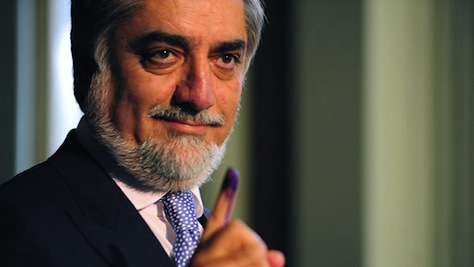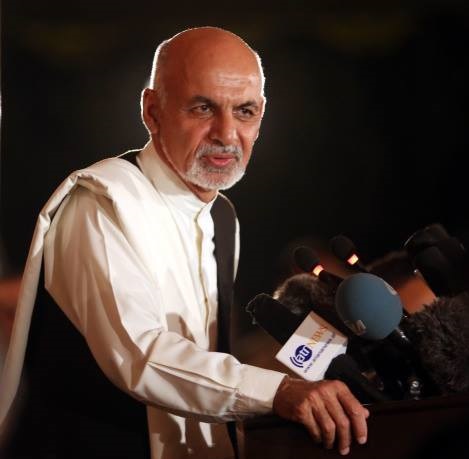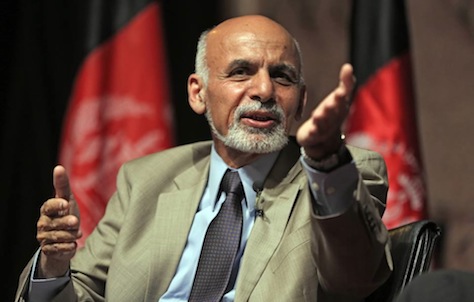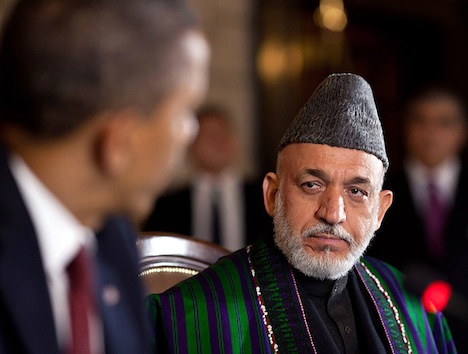
It’s early yet, but with just 10% of the vote counted in Afghanistan’s presidential election, the runner-up from the 2009 race, Abdullah Abdullah, narrowly leads the initial counting from the April 5 election.
The results point to a tight race between Abdullah (pictured above), a former foreign minister between 2001 and 2005, and Ashram Ghani Ahmadzai, a former finance minister and World Bank official.
While there’s reason to believe that the remaining 90% to be counted could vary significantly from the first 10%, the initial results come from 26 of 34 provinces, so there’s a compelling basis to believe that Abdullah and Ghani will proceed to a runoff later this year.
* * * * *
RELATED: Afghanistan hopes for calm as key presidential election approaches
* * * * *
Abdullah led with 41.9% of the vote, followed closely by Ghani with 37.6%. Far behind in third place with 9.8%, is Zalmai Rassoul, who served as Afghanistan’s foreign minister from 2010 until late last year, when he stepped down to run for the presidency. Though outgoing president Hamid Karzai is neutral, Rassoul is widely seen as the candidate of the Karzai administration, and Karzai’s brother, Quayum Karzai, endorsed Rassoul when he dropped out of the race on March 6.
What to make of the initial results?
With the caveat that the final preliminary count isn’t due until April 24 and, the definitively final results won’t be announced until May 14, it seems almost certain that Abdullah and Ghani will face each other in a runoff — and Abdullah is apparently already reaching out to Rassoul, anticipating a second round.
Though Karzai has increasingly distanced himself from the US government under the presidency of Barack Obama, both candidates would improve ties with the United States, and both candidates support instituting a status-of-forces agreement that contemplates a small security role for the US military after most US troops largely withdraw from Afghanistan at the end of this year.
Ghani has spent much more time living and working in the United States, and accordingly, most US and European diplomats are quietly rooting for his success, though either Ghani or Abdullah would likely represent an improvement in US-Afghan relations. He taught at Johns Hopkins University, worked at the World Bank, was a finalist to become secretary-general of the United Nations in 2006, and worked with UN special representative Lakhdar Brahimi on the Bonn Agreement that served as a framework to transition from US military forces to an Afghan-led government in the early years after the 2001 military action to remove the Taliban from power.
In contrast to the 2009 vote, which drew turnout of around 30% to 33%, the 2014 election recorded turnout more like 60%. That vote was widely marred by fraud and political violence. After strong pressure from the United States and other international voices, Karzai’s government agreed to a runoff against Abdullah, though Abdullah ultimately refused to take part in the runoff, given the evidence of fraud from the previous round.
Both US and Afghan officials hope to avoid a similarly farcical result in 2014, which could undermine the election’s ultimate winner.
Though most of Afghanistan’s leaders in the past three centuries have belonged to the dominant Pashtun ethnic group, Abdullah claims dual Pashtun and Tajik ethnicity. Ghani, for his part, has recruited one of the most notorious warlords in Afghanistan, Abdul Rashid Dostum, who is Uzbek, as one of his running mates.
Photo credit to Hashmatullah/AFP.
![]()




